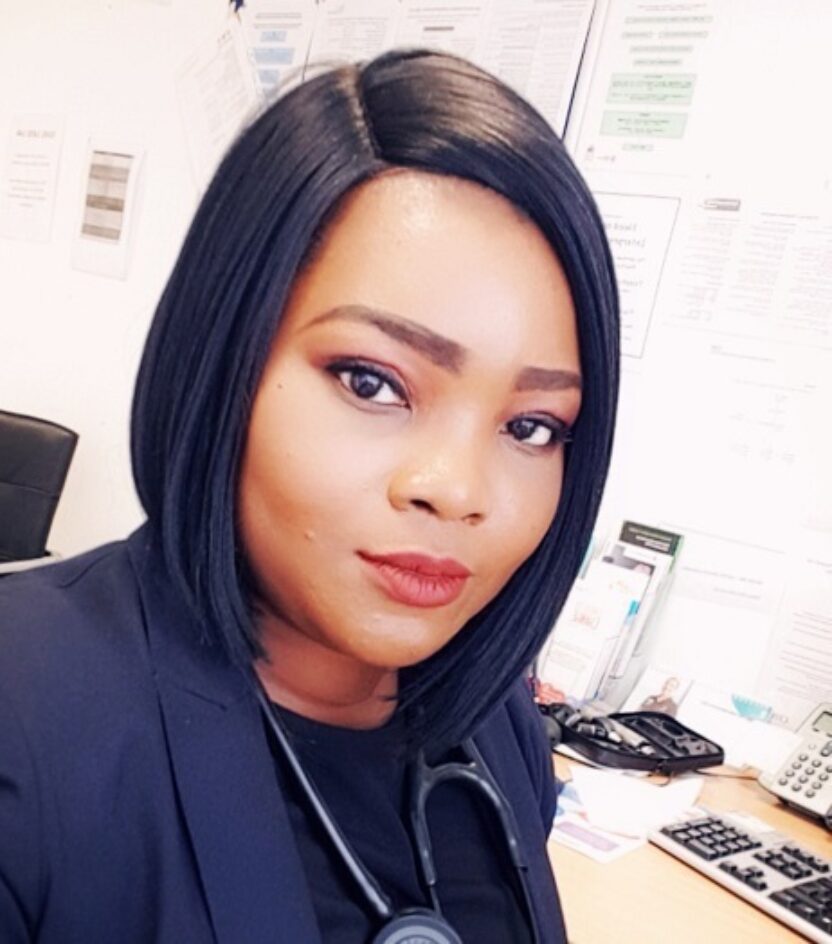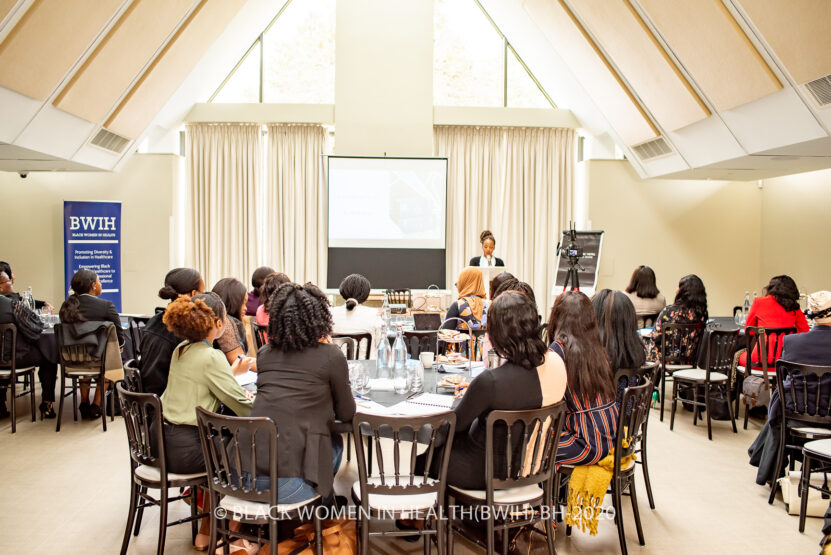An interview with Dr Omon Imohi, founder of Black Women in Health

As part of Black History Month, we seek to celebrate and share the stories of Black individuals who are demonstrating exceptional leadership, talent, and impact in healthcare throughout the year.
Here we speak with Dr. Omon Imohi who, alongside her work as a family physician, is the founder of the non-profit organisation, Black Women in Health.
Dr. Imohi is also an author, health content creator, transformational coach and speaker who is aiming to inspire and drive meaningful change in people's lives through her work.
Tell us about your journey in the healthcare industry and the role you play as founder of Black Women in Health?
My journey began with a medical degree from Windsor University School of Medicine in St Kitts and Nevis, followed by postgraduate training in the UK. Now, I am a family physician, Fellow of the Royal College of General Practitioners in the UK and Vice- Chair for RCGP Mersey faculty board.
My approach to healthcare is holistic, considering the interplay of socioeconomic and psychological factors that affect individuals. My special interest is in Women's health and preventive medicine but beyond that, I am an advocate for pride in diversity and inclusion.
My work as the founder of Black Women in Health aims to empower Black female healthcare professionals to achieve maximum professional and personal development through boosting their presence in medicine, leadership, policy, and education. We address diversity challenges and foster professional growth, promote diversity pride and advocate for healthcare equality.

As a healthcare professional, what do you see as the most pressing health disparities and challenges facing Black communities today?
Health disparities in Black communities include limited healthcare access, chronic conditions, maternal mortality, mental health issues, infectious diseases, environmental factors, socioeconomic challenges, racial pain gap and cultural competency gaps among healthcare providers.
Addressing these challenges requires a multi-faceted approach, including policy changes, increased healthcare access, education, community engagement, and cultural sensitivity training for healthcare professionals. It's essential to work toward a more equitable and just healthcare system that prioritises the well-being of all individuals, regardless of their racial or ethnic background.
How has the healthcare sector changed in the years you have worked in it - from representation and diversity to improved patient outcomes for Black women? Is there one key ‘thing’ that would enable a faster rate of change to improve Black female patient outcomes?
Over the years I've worked in the healthcare sector, there have been notable changes in various aspects, including representation and diversity, as well as improvements in patient outcomes for Black women. Representation has seen some progress, with a growing recognition of the importance of diversity in healthcare. More Black women are entering the field, and their voices are becoming more prominent in discussions surrounding healthcare disparities. However, there is still work to be done to achieve equitable representation at all levels of healthcare.
In terms of patient outcomes, while there have been incremental improvements, disparities still persist. Maternal mortality rates for Black women, for example, remain significantly higher than those for white women. These disparities result from a complex interplay of factors, including socioeconomic determinants, access to care, and bias in the healthcare system.
Addressing systemic bias and racism in healthcare is key to improving Black female patient outcomes. This involves anti-bias training, cultural competence, and holding institutions accountable. Promoting community engagement and education empowers Black women to navigate the system effectively, and clear policies are crucial to reduce disparities in maternal care. A collective effort from healthcare providers, institutions, policymakers, and the community is essential for faster change and better outcomes for Black women.
Representation has seen some progress, with a growing recognition of the importance of diversity in healthcare. More Black women are entering the field, and their voices are becoming more prominent in discussions surrounding healthcare disparities. However, there is still work to be done to achieve equitable representation at all levels of healthcare.
How might healthcare infrastructure be redesigned or improved to ensure better access and healthcare outcomes for Black communities and other underserved populations?
To enhance healthcare access and outcomes for Black communities and underserved populations, we should focus on equitable resource distribution, cultural competency training, community health centres, telemedicine, health literacy, reducing socioeconomic barriers, collaborative care, patient navigation, policy changes, research, data collection, community engagement, and culturally tailored programs. These measures collectively address disparities and promote health equity.
In the context of Black History Month, what role do you believe recognising the contributions of Black women can play in helping to promote inclusivity and diversity in the healthcare industry?
Recognising the contributions of Black women in healthcare during Black History Month is a vital step in promoting inclusivity and diversity. It highlights the often overlooked or underrepresented achievements of Black women who have made significant contributions to healthcare. By celebrating their accomplishments, we not only honour their legacy but also inspire the current and future generations of Black women to pursue careers in healthcare. This recognition sends a powerful message that diversity is an asset in the industry, fostering a more inclusive and equitable environment that benefits patients and healthcare professionals alike. It also encourages dialogue and action to address healthcare disparities and biases, ultimately leading to better patient care and outcomes for all.
In essence, recognising Black women's contributions in healthcare is an important part of the broader effort to build a more diverse and inclusive healthcare sector. And not just for one month but every day.

Representation and mentorship are crucial for the advancement of underrepresented groups. Can you share the impact of mentors and role models in your own career, and how can organisations in healthcare can promote mentorship and diversity?
The power of representation cannot be overstated. It has been profoundly meaningful to have mentors and role models who not only share my ethnic background but also understand the unique journey of a Black woman in the healthcare industry. Their influence has left an indelible impact on me, igniting a profound sense of inspiration. Witnessing trailblazers like Prof. Bola Owolabi, Prof. Margaret Ikpoh, Dr. Onyi Okonkwo, and Prof. Diane Ashiru-Oredope tirelessly working to bridge disparities and effect meaningful change has not only motivated me to aspire to greater heights but has also emboldened my resolve to contribute more significantly to this cause. Their dedication serves as a beacon of hope, demonstrating that the path toward equity and progress is illuminated by those who lead the way.
Mentors and role models in healthcare are instrumental in guiding and inspiring underrepresented groups. They provide vital support, empowering individuals to overcome challenges and excel in their careers, while also diversifying the talent pool in the healthcare sector. To foster inclusivity and diversity, healthcare organisations must establish structured mentorship programs, offer diversity training, secure leadership commitment, facilitate networking events, recognise diverse role models, allocate resources to mentorship initiatives, assess progress through measurement, collaborate with external organisations, implement inclusive recruitment practices, and establish employee resource groups. These efforts result in a stronger, more diverse workforce and improved patient care and outcomes, creating a more inclusive and equitable healthcare environment.
Black women in healthcare have a wealth of knowledge and expertise. How can this collective wisdom be harnessed to drive meaningful change, not only within the industry but also in public health and healthcare policy?
The collective wisdom of Black women in healthcare represents an invaluable resource that can drive transformative change within the industry, public health, and healthcare policy.
To harness this rich pool of knowledge and expertise, it is essential to create platforms and opportunities that amplify their voices and experiences. This can be achieved through initiatives that encourage mentorship, leadership development, and networking among Black women in healthcare, enabling them to share their insights and innovative solutions. Additionally, engaging Black women in healthcare in research, policymaking, and decision-making processes can ensure that their unique perspectives are integrated into healthcare policies and strategies. Recognising and celebrating their achievements can serve as an inspiration for future generations, encouraging more Black women to pursue careers in healthcare and thus, contributing to a diverse and inclusive healthcare workforce. By actively leveraging the collective wisdom of Black women in healthcare, we can catalyse meaningful change that addresses healthcare disparities, enhances patient outcomes, and advances equity within the industry and broader society.
Engaging Black women in healthcare in research, policymaking, and decision-making processes can ensure that their unique perspectives are integrated into healthcare policies and strategies. Recognising and celebrating their achievements can serve as an inspiration for future generations, encouraging more Black women to pursue careers in healthcare and thus, contributing to a diverse and inclusive healthcare workforce.
Finally, as we celebrate Black History Month, can you share your vision for a more inclusive and equitable healthcare industry, particularly with regard to the roles and contributions of Black women?
As we celebrate Black History Month and underscore the importance of inclusivity, my vision for a more inclusive and equitable healthcare industry is one where the roles and contributions of Black women are not only recognised but celebrated and woven into the very fabric of healthcare.
In this vision, Black women are well-represented in leadership positions, shaping healthcare policies, and spearheading initiatives that directly address disparities and promote equity. They serve as mentors and role models, guiding future generations and inspiring others to join the healthcare sector. The voices of Black women are heard and valued, where their expertise and experiences are integrated into research, policymaking, and clinical practice. Their profound wisdom and innovative solutions become instrumental in addressing the unique healthcare needs of the communities they serve, ultimately leading to improved patient outcomes.
In sum, my vision is of a healthcare industry where Black women's contributions are fully recognised and where they play an integral role in forging a more just, equitable, and inclusive healthcare system, leaving a lasting legacy of improved health outcomes and a brighter future for all.
To learn more about the work of Black Women in Health including forthcoming events, membership and mentorship opportunities please visit the Black Women in Health website or the BWIH Linkedin page. You can also connect with Dr Omon Imohi on Linkedin.
